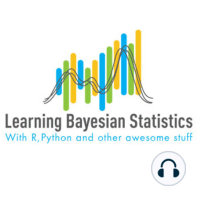47 min listen

#88 Bridging Computation & Inference in Artificial Intelligent Systems, with Philipp Hennig
#88 Bridging Computation & Inference in Artificial Intelligent Systems, with Philipp Hennig
ratings:
Length:
72 minutes
Released:
Aug 10, 2023
Format:
Podcast episode
Description
Proudly sponsored by PyMC Labs, the Bayesian Consultancy. Book a call, or get in touch!Listen on PoduramaMy Intuitive Bayes Online Courses1:1 Mentorship with meToday, we’re gonna learn about probabilistic numerics — what they are, what they are good for, and how they relate computation and inference in artificial intelligent systems.To do this, I have the honor of hosting Philipp Hennig, a distinguished expert in this field, and the Chair for the Methods of Machine Learning at the University of Tübingen, Germany. Philipp studied in Heidelberg, also in Germany, and at Imperial College, London. Philipp received his PhD from the University of Cambridge, UK, under the supervision of David MacKay, before moving to Tübingen in 2011. Since his PhD, he has been interested in the connection between computation and inference. With international colleagues, he helped establish the idea of probabilistic numerics, which describes computation as Bayesian inference. His book, Probabilistic Numerics — Computation as Machine Learning, co-authored with Mike Osborne and Hans Kersting, was published by Cambridge University Press in 2022 and is also openly available online. So get comfy to explore the principles that underpin these algorithms, how they differ from traditional numerical methods, and how to incorporate uncertainty into the decision-making process of these algorithms.Our theme music is « Good Bayesian », by Baba Brinkman (feat MC Lars and Mega Ran). Check out his awesome work at https://bababrinkman.com/ !Thank you to my Patrons for making this episode possible!Yusuke Saito, Avi Bryant, Ero Carrera, Giuliano Cruz, Tim Gasser, James Wade, Tradd Salvo, William Benton, James Ahloy, Robin Taylor,, Chad Scherrer, Zwelithini Tunyiswa, Bertrand Wilden, James Thompson, Stephen Oates, Gian Luca Di Tanna, Jack Wells, Matthew Maldonado, Ian Costley, Ally Salim, Larry Gill, Ian Moran, Paul Oreto, Colin Caprani, Colin Carroll, Nathaniel Burbank, Michael Osthege, Rémi Louf, Clive Edelsten, Henri Wallen, Hugo Botha, Vinh Nguyen, Raul Maldonado, Marcin Elantkowski, Adam C. Smith, Will Kurt, Andrew Moskowitz, Hector Munoz, Marco Gorelli, Simon Kessell, Bradley Rode, Patrick Kelley, Rick Anderson, Casper de Bruin, Philippe Labonde, Michael Hankin, Cameron Smith, Tomáš Frýda, Ryan Wesslen, Andreas Netti, Riley King, Yoshiyuki Hamajima, Sven De Maeyer, Michael DeCrescenzo, Fergal M, Mason Yahr, Naoya Kanai, Steven Rowland, Aubrey Clayton, Jeannine Sue, Omri Har Shemesh, Scott Anthony Robson, Robert Yolken, Or Duek, Pavel Dusek, Paul Cox, Trey Causey, Andreas Kröpelin, Raphaël R, Nicolas Rode, Gabriel Stechschulte, Arkady, Kurt TeKolste, Gergely Juhasz, Marcus Nölke, Maggi Mackintosh, Grant Pezzolesi, Avram Aelony, Joshua Meehl, Javier Sabio, Kristian Higgins, Alex Jones, Gregorio Aguilar and Matt Rosinski.Visit
Released:
Aug 10, 2023
Format:
Podcast episode
Titles in the series (100)
#5 How to use Bayes in the biomedical industry, with Eric Ma by Learning Bayesian Statistics